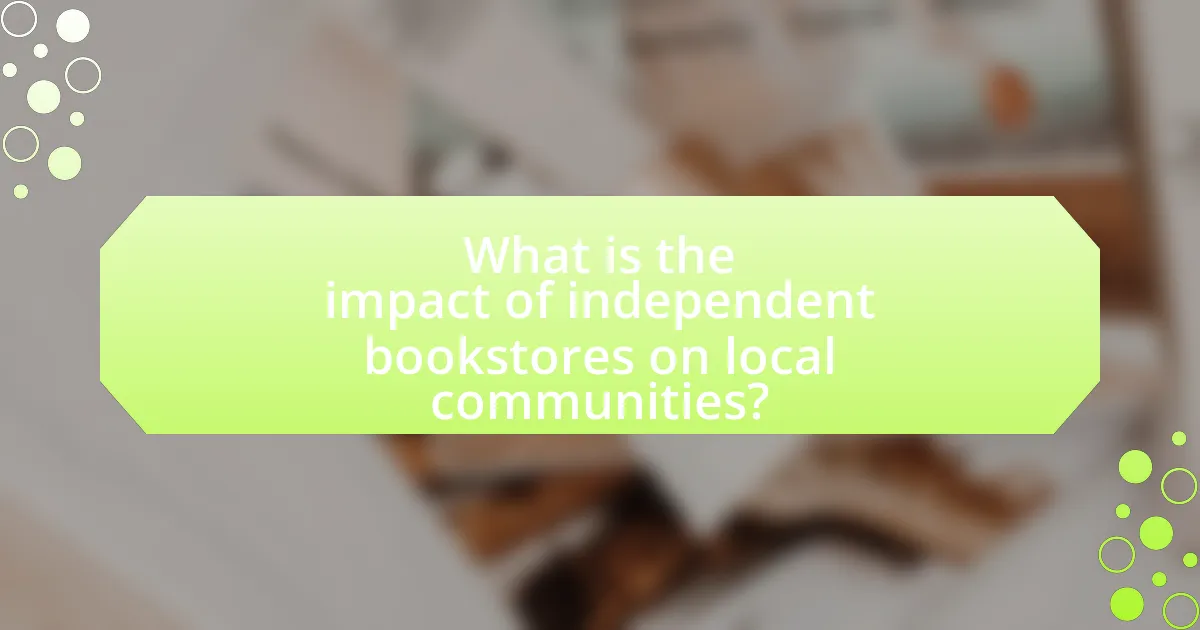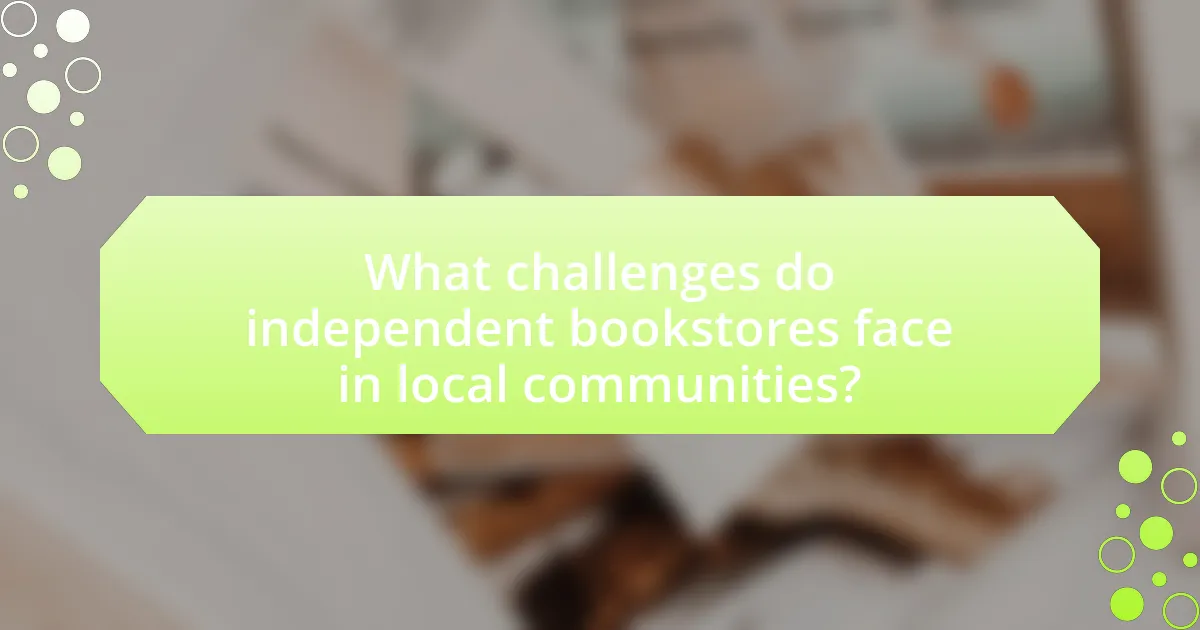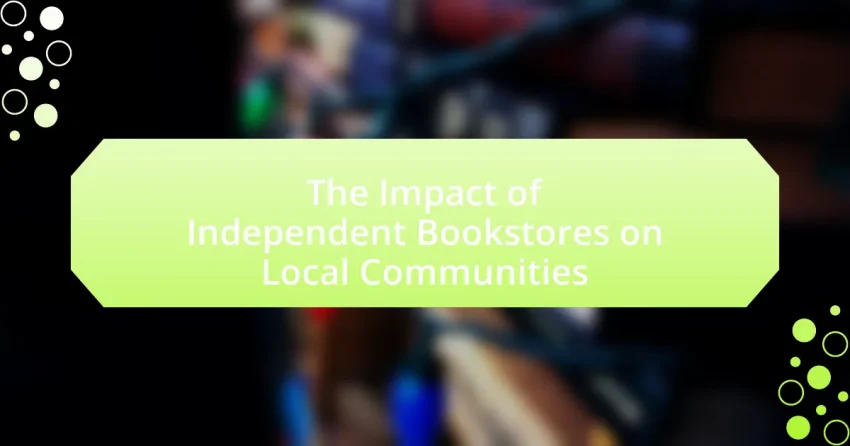Independent bookstores play a significant role in enhancing local communities by driving economic growth, fostering cultural engagement, and promoting literacy. They create jobs, support local authors, and serve as community hubs that host events, thereby strengthening social ties. Additionally, independent bookstores contribute to community identity by curating selections that reflect local values and interests, while also preserving local culture through regional literature and events. Despite facing challenges from online retailers and rising operational costs, independent bookstores continue to innovate and adapt, ensuring their relevance and sustainability in the community.

What is the impact of independent bookstores on local communities?
Independent bookstores positively impact local communities by fostering economic growth, enhancing cultural engagement, and promoting literacy. These establishments contribute to the local economy by creating jobs and supporting local authors and artists, with studies indicating that independent bookstores generate approximately three times more economic activity per square foot than their chain counterparts. Furthermore, they serve as community hubs, hosting events that encourage social interaction and cultural exchange, which strengthens community ties. Additionally, independent bookstores often prioritize diverse and unique literary selections, promoting literacy and education within the community. This multifaceted influence underscores the vital role independent bookstores play in enriching local environments.
How do independent bookstores contribute to community identity?
Independent bookstores contribute to community identity by serving as cultural hubs that reflect local values and interests. These bookstores often curate selections that resonate with the community’s demographics, showcasing local authors and themes relevant to residents. For instance, a study by the American Booksellers Association found that independent bookstores foster community engagement by hosting events such as book readings, signings, and discussions, which strengthen social ties among residents. Additionally, independent bookstores often collaborate with local organizations, enhancing their role as vital community spaces that promote literacy and education. This engagement not only supports local economies but also reinforces a sense of belonging and shared identity among community members.
What role do independent bookstores play in preserving local culture?
Independent bookstores play a crucial role in preserving local culture by serving as community hubs that promote regional literature, host local authors, and foster cultural events. These bookstores often curate selections that reflect the unique narratives and histories of their communities, making literature accessible and relevant to local residents. For example, a study by the American Booksellers Association found that independent bookstores contribute to local economies by supporting local authors and artists, thereby reinforcing cultural identity. Additionally, independent bookstores frequently organize events such as readings, book clubs, and workshops that engage the community and celebrate local culture, further solidifying their role as vital cultural institutions.
How do independent bookstores foster a sense of belonging among residents?
Independent bookstores foster a sense of belonging among residents by creating community hubs that encourage social interaction and cultural engagement. These bookstores often host events such as book readings, signings, and discussion groups, which bring together diverse groups of people and promote shared experiences. Research indicates that independent bookstores contribute to local economies and community identity, as they often reflect the interests and values of the neighborhoods they serve. For instance, a study by the American Booksellers Association found that independent bookstores are more likely to support local authors and artists, further enhancing community ties and fostering a sense of pride among residents.
What economic benefits do independent bookstores provide to local communities?
Independent bookstores provide significant economic benefits to local communities by fostering local employment, supporting local economies, and enhancing community engagement. These bookstores create jobs, with studies indicating that independent bookstores employ more people per square foot than large chain stores, thus contributing to lower local unemployment rates. Additionally, they circulate a higher percentage of their revenue back into the local economy; for instance, a study by the American Booksellers Association found that independent bookstores return approximately 70% of their revenue to the local economy compared to 30% for chain stores. This reinvestment supports local suppliers and services, further stimulating economic growth. Furthermore, independent bookstores often serve as community hubs, hosting events that attract visitors and promote local culture, which can lead to increased foot traffic and spending in surrounding businesses.
How do independent bookstores support local authors and artists?
Independent bookstores support local authors and artists by providing a platform for their work through events, promotions, and shelf space. These bookstores often host book signings, readings, and art exhibitions, allowing local creators to showcase their talents directly to the community. For instance, according to a study by the American Booksellers Association, independent bookstores contribute significantly to local economies by prioritizing local authors in their inventory, which fosters a sense of community and encourages local purchasing. Additionally, many independent bookstores collaborate with local artists for cover designs and promotional materials, further integrating local talent into their business model.
What is the impact of independent bookstores on local employment rates?
Independent bookstores positively impact local employment rates by creating jobs and stimulating economic activity within their communities. These establishments often employ local residents, contributing to job creation in retail and related sectors. According to a study by the American Booksellers Association, independent bookstores generate approximately 1.5 jobs for every 1,000 square feet of retail space, which translates to significant employment opportunities in smaller towns and urban areas. Additionally, independent bookstores often source products from local suppliers, further enhancing local economic growth and employment.
How do independent bookstores influence local education and literacy?
Independent bookstores significantly influence local education and literacy by providing access to diverse reading materials and fostering community engagement. These bookstores often host events such as author readings, book clubs, and educational workshops, which promote literacy and encourage a love for reading among community members. For instance, a study by the American Booksellers Association found that independent bookstores contribute to local literacy initiatives by partnering with schools and libraries, thereby enhancing educational resources available to students. Additionally, independent bookstores frequently curate selections that reflect local interests and cultures, making literature more relatable and accessible, which further supports literacy development in the community.
What programs do independent bookstores offer to promote literacy?
Independent bookstores offer various programs to promote literacy, including reading programs, book clubs, author events, and educational workshops. These initiatives aim to engage the community in reading and literacy activities. For instance, many independent bookstores host storytime sessions for children, which not only encourage early literacy skills but also foster a love for reading from a young age. Additionally, book clubs provide a platform for discussion and critical thinking, enhancing comprehension skills among participants. Author events often include readings and discussions that inspire readers and promote literary appreciation. Educational workshops may cover topics such as writing, publishing, and literacy development, further supporting community literacy efforts. These programs collectively contribute to a culture of reading and learning within local communities.
How do independent bookstores collaborate with schools and libraries?
Independent bookstores collaborate with schools and libraries by organizing events such as author readings, book fairs, and educational workshops. These collaborations enhance literacy and foster a love for reading among students and community members. For instance, many independent bookstores partner with local schools to host book clubs or provide discounts on bulk book purchases for educational purposes, thereby supporting curriculum needs. Additionally, bookstores often donate books to libraries or schools, contributing to resource availability. This synergy not only enriches the educational landscape but also strengthens community ties, as evidenced by initiatives like the American Booksellers Association’s “Indie Bookstore Day,” which encourages local engagement and promotes reading culture.

What challenges do independent bookstores face in local communities?
Independent bookstores face significant challenges in local communities, primarily due to competition from large online retailers and chain stores. This competition often leads to reduced sales and profit margins for independent bookstores, making it difficult for them to sustain operations. According to a 2019 report by the American Booksellers Association, independent bookstores have seen a resurgence, but they still struggle with limited marketing budgets and the need for community support to thrive. Additionally, rising rental costs in urban areas further strain their financial viability, as many independent bookstores operate on thin margins. These factors collectively hinder their ability to compete effectively and maintain a loyal customer base.
How does competition with online retailers affect independent bookstores?
Competition with online retailers significantly impacts independent bookstores by reducing their customer base and sales revenue. Independent bookstores often struggle to compete with the lower prices and convenience offered by online giants like Amazon, which can lead to decreased foot traffic and sales. According to a 2019 report by the American Booksellers Association, independent bookstores saw a 3.5% decline in sales due to the rise of online shopping. This competition forces many independent bookstores to adapt by enhancing their community engagement, offering unique events, and curating specialized selections to attract local customers.
What strategies do independent bookstores use to compete with online sales?
Independent bookstores employ several strategies to compete with online sales, including personalized customer service, community engagement, and curated selections. Personalized customer service allows staff to build relationships with customers, offering tailored recommendations that online platforms cannot replicate. Community engagement through events such as book signings, readings, and local author showcases fosters a sense of belonging and encourages local patronage. Additionally, curated selections highlight unique and diverse titles that may not be available on larger online platforms, appealing to niche markets and fostering a loyal customer base. These strategies collectively enhance the shopping experience and strengthen the bookstore’s role within the community.
How do independent bookstores adapt to changing consumer preferences?
Independent bookstores adapt to changing consumer preferences by diversifying their inventory and enhancing customer experience. They often curate selections that reflect local interests and trends, such as featuring local authors or popular genres, which helps them stay relevant. Additionally, many independent bookstores host community events, book clubs, and author signings to foster a sense of community and engage customers directly. According to a 2021 survey by the American Booksellers Association, 70% of independent bookstores reported that community engagement activities significantly boosted their sales and customer loyalty. This adaptability allows them to meet the evolving demands of consumers while maintaining their unique identity.
What financial challenges do independent bookstores encounter?
Independent bookstores encounter several financial challenges, primarily including competition from online retailers, rising operational costs, and limited access to capital. Competition from giants like Amazon significantly reduces their market share, as these online platforms often offer lower prices and greater convenience. Additionally, rising costs associated with rent, utilities, and inventory can strain their budgets, making it difficult to maintain profitability. According to a 2021 survey by the American Booksellers Association, 70% of independent bookstores reported that high rent was a significant financial burden. Furthermore, independent bookstores often struggle to secure funding or loans, as traditional financial institutions may view them as high-risk investments, limiting their ability to expand or invest in marketing.
How do rising costs impact the sustainability of independent bookstores?
Rising costs significantly threaten the sustainability of independent bookstores by increasing operational expenses and reducing profit margins. As expenses for rent, utilities, and inventory rise, independent bookstores struggle to maintain financial viability, often leading to higher prices for consumers. According to a 2021 report by the American Booksellers Association, nearly 30% of independent bookstores reported that rising costs were a major factor in their decision to close or reduce operations. This financial strain can limit their ability to invest in community events, author signings, and local partnerships, which are essential for fostering community engagement and loyalty. Thus, the combination of increased costs and diminished resources directly impacts the ability of independent bookstores to thrive within their local communities.
What funding opportunities are available for independent bookstores?
Independent bookstores can access various funding opportunities, including grants, loans, and crowdfunding. Organizations such as the American Booksellers Association offer grants specifically for independent bookstores, while local arts councils and community foundations may provide funding for cultural initiatives. Additionally, the Small Business Administration offers loan programs that can support bookstore operations. Crowdfunding platforms like Kickstarter and Indiegogo allow bookstores to raise funds directly from their communities, leveraging local support. These funding avenues are crucial for sustaining operations and fostering community engagement.

What are the future prospects for independent bookstores in local communities?
The future prospects for independent bookstores in local communities are increasingly positive, driven by a growing consumer preference for unique, personalized shopping experiences. Research indicates that independent bookstores foster community engagement and support local economies, with studies showing that for every $100 spent at a local bookstore, approximately $68 stays within the community, compared to $43 for chain stores. Additionally, the rise of community-focused events, such as author readings and book clubs, enhances their role as cultural hubs, attracting more visitors and fostering loyalty among customers. This trend suggests that independent bookstores can thrive by leveraging their unique offerings and community connections.
How can independent bookstores innovate to remain relevant?
Independent bookstores can innovate to remain relevant by diversifying their offerings and enhancing customer experience. By incorporating events such as author readings, book clubs, and workshops, these stores create community engagement that fosters loyalty. Additionally, leveraging technology through online sales platforms and social media marketing can expand their reach and attract a broader audience. A study by the American Booksellers Association found that independent bookstores that host community events see a 20% increase in foot traffic, demonstrating the effectiveness of these strategies in driving customer interest and sales.
What role does technology play in the future of independent bookstores?
Technology plays a crucial role in the future of independent bookstores by enhancing their operational efficiency and customer engagement. Independent bookstores can utilize e-commerce platforms to reach a broader audience, allowing them to sell books online and compete with larger retailers. For instance, a study by the American Booksellers Association found that 80% of independent bookstores reported increased sales through online channels during the pandemic. Additionally, technology enables independent bookstores to leverage social media for marketing, fostering community connections and promoting events, which can drive foot traffic and sales. Furthermore, inventory management systems powered by technology help streamline operations, ensuring that bookstores can efficiently manage stock and respond to customer demand.
How can independent bookstores enhance community engagement through events?
Independent bookstores can enhance community engagement through events by hosting author readings, book clubs, and workshops that foster interaction among community members. These events create a space for dialogue and connection, allowing individuals to share their thoughts and experiences related to literature and local culture. For instance, a study by the American Booksellers Association found that 77% of independent bookstores host community events, which significantly increases foot traffic and strengthens local ties. By providing a platform for local authors and artists, independent bookstores also support the creative economy, further embedding themselves in the community fabric.
What best practices can independent bookstores adopt for success?
Independent bookstores can adopt several best practices for success, including building strong community relationships, curating diverse and relevant inventory, and leveraging digital marketing strategies. Establishing community ties through events, book clubs, and partnerships with local schools fosters customer loyalty and engagement. A well-curated selection that reflects local interests and trends can attract a dedicated customer base, as studies show that personalized offerings increase sales. Additionally, utilizing social media and email marketing effectively can enhance visibility and drive foot traffic, with data indicating that 70% of consumers prefer to learn about products through content rather than traditional advertising.
How can independent bookstores build strong relationships with customers?
Independent bookstores can build strong relationships with customers by fostering a sense of community through personalized service and engaging events. By offering tailored recommendations based on individual customer preferences, bookstores create a welcoming atmosphere that encourages repeat visits. Additionally, hosting book clubs, author signings, and community events strengthens connections between the store and its patrons, making customers feel valued and part of a larger literary community. Research indicates that 70% of consumers prefer shopping at local businesses due to the personalized experience they provide, highlighting the effectiveness of these strategies in cultivating loyalty and trust.
What marketing strategies are effective for independent bookstores?
Effective marketing strategies for independent bookstores include community engagement, social media promotion, and hosting events. Community engagement fosters relationships with local customers, which can lead to increased loyalty and sales. For instance, independent bookstores that collaborate with local schools and libraries often see a rise in foot traffic and sales, as they become integral parts of the community. Social media promotion allows bookstores to reach a wider audience, with platforms like Instagram and Facebook being particularly effective for showcasing new arrivals and events. Research indicates that 70% of consumers are influenced by social media when making purchasing decisions. Additionally, hosting events such as book signings, readings, and workshops can attract diverse groups, enhancing visibility and community involvement. According to a study by the American Booksellers Association, bookstores that regularly host events report higher sales and customer retention rates.
